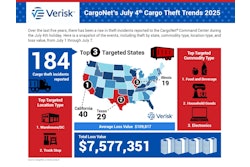The Household Goods Shipping Consumer Protection Act currently under consideration by Congress combats the rise in double brokering and freight fraud by giving the Federal Motor Carrier Safety Administration (FMCSA) more authority to penalize fraudulent companies, allowing the agency to levy civil penalties and establishing stricter requirements for proving a business is legitimate.
Speaker 1:
I'm from the government and I'm here to help. Why that might not be a bad thing for combating double brokering and freight fraud. You're watching CCJs 10 44, a weekly web episode that brings you the latest trucking industry news and updates from the editors of ccj. Don't forget to subscribe and hit the bell for notifications so you'll never miss an installment of 10 44. Hey everybody, welcome back. I'm Jason Cannon and my co-host is Matt Cole. The household goods shipping Consumer Protection Act currently under consideration by Congress aims to give the Federal Motor Carrier Safety Administration more power to protect consumers from fraud by requiring companies in the household goods sector to establish a principle place of business to prohibit fraudulent companies from skirting existing regulations.
Speaker 2:
That would be a blow to double brokers because the new rule would give F-M-C-S-A the authority to levy civil penalties against under registered shippers, and the agency would be authorized to set requirements to ensure motor carriers, brokers and freight forwarders are legitimate businesses.
Speaker 3:
The fact that it's even made it to this point where it's being discussed in committee and advance in committee I think is a function of just how significant the problem has become to the point where it's now being addressed at the federal government level. I think what the act will do is give the government teeth to actually enforce some of the activity that's happening. I think a lot of it is focused on largely the rise in double brokering, which has grown exponentially over the last few years, and we expect to continue to grow, and there's a lot of reasons why we expect that. And really this gives the government the ability and also the funding to go and identify where double brokering or other types of fraud, but particularly double brokering is happening and gives them the authority to go in and address it with fines and even shutting down fraudulent businesses.
So I think from a government standpoint, I mean back to the quote Ronald Reagan's quote around asking the government to do something, I think that's very fair, but the industry should look at the advancement of this act and say, okay, now that the government's getting involved, it's an additional tool in my tool belt that I can use to reduce the likelihood of fraud. So it shouldn't stop carriers from deploying technology and getting close with their partners to reduce fraud, but it's just another tool that can be used. The thing that I'm most excited about as this, we see this legislation move through committee and hopefully get passed. It's another step to acknowledging a problem that's always been there, but now is getting to be mainstream enough to where financial leadership at shippers and carriers and brokers will start to take note and start to invest in really protecting carriers and protecting their assets.
So like I said, it's really just another tool in the tool belt, but it's something that will raise awareness within the industry that, hey, this is a huge problem. It's growing, but there are tools we can deploy to combat it. We don't just have to be victims. We can start to go on offense to try to prevent some of this fraud that's happening in the supply chain. It's always been just kind of accepted as, hey, this is something that happens, not really much you can do about it. And that's just not the case, especially with technology Now, it'll be supported with legislation, Hey, you don't have to be a victim. You can go on the offense and you can stop this kind of stuff from happening. And those carriers and shippers that do that will be at a significant advantage in the marketplace, those that kind of stay ahead of legislation and make technology investments to protect the assets that they're moving.
Speaker 1:
As important as technology is a tool in combating double brokering and fraud, it's also a tool used by bad actors that's driving growth in these types of crimes.
Speaker 3:
The most impactful technology that's everywhere right now is the advancement of ai. And I think when you think about freight fraud, cargo theft and double brokering specifically utilizing very advanced AI capabilities is going to make double brokering much harder to detect. And so brokers and carriers will have the ability to scrape large amounts of data and to hide their actions much more effectively utilizing various AI technologies. And so as those capabilities are enhanced on the bad guy side, on the fraudster side, you need the reciprocal kind of approach from the government and from the industry to identify where this type of activity is happening. So there's an element in the act that gives the government the power to start collecting data to, for example, verify a physical location of a carrier. And it's that type of information that is easier to make up using AI capabilities, but if the government's collecting that data, they can start to combat it with some of their own AI tools. So I think there's going to be a rise because of new technology. We have to empower people, companies in the marketplace and the government to utilize similar technology to combat what's happening.
Speaker 2:
Double brokering has been around forever, but the complexities of the modern supply chain and the ongoing digitalization of freight where fewer physical documents exist and are seen by fewer humans have really opened the door for the bad guys.
Speaker 3:
Two things, I think at a macro level, companies are looking to squeeze more and more out of their supply, more and more cost out of their supply chain, and in order to do that, they're making their supply chains more and more complex. So they're willing to go and use maybe multiple brokers. Multiple carriers run routes that they don't typically run in order to get the lowest possible costs. They're also sourcing inputs from more and more suppliers to get the lowest possible cost. So I think you've seen this trend really over the last 10 years of just in time type of supply chain where you're just squeezing all of the costs set of the supply chain, which has caused the supply chains have become extremely complex. And where there's complexity, there's an opportunity for fraud, there's an opportunity to exploit that complexity because it's harder just to understand what's going on.
So I think at the macro level, the supply chains have becomes so complex that it's hard to maintain visibility, which leaves gaps in your monitoring and opportunities for bad actors. And then I think the digitization of the supply chain, the way that bills of lading, everything is digitized. When things are digitized, it's great, but it's also easier to conduct fraud when things are happening in a digital manner. So I think those are really the two big trends that I've seen. The complexity increase of complexity and digitization that have created an environment where bad actors can exploit supply chains at a gigantic level at scale,
Speaker 1:
A critical step in getting your arms around a potential incident of fraud is streamlining flows of data and communication, and then you start looking for areas of risk.
Speaker 3:
The first step I always recommend is to centralize your visibility. Fragmented data, data from your customers, from your suppliers, from carrier partners, from brokers, really is the enemy of security. Because I'm getting data from a number of different sources that data, each different data source can be a target and can be a place where you can become exploited. You need a centralized place where you can view all of your asset information, your asset locations, and have kind of a unified intelligence platform. That's step number one. I think. Like I mentioned, the complexity piece, there's so much data and carriers and others, they just kind of lose track. So that's number one. Get a hold of where your data is. Step two is you can start to identify where there are vulnerabilities within your operations. You can start to identify what routes that you're running or what lanes are highest risk, where am I parking that isn't protected or is in a high risk area. So once you have the data, then you identify where there's risk, where there's waste within your operation. And then once you identify those high risk areas, you can then start deploying technology to protect any and all assets that flow through. To summarize, it's a three-step process. You have to centralize your visibility, unify your data. Once you do that, you have to identify where there's the highest risk. And then the third thing, you have to start deploying technology to reduce your level of risk.
Speaker 2:
The technology piece, the third step is important in a carrier's liability for a potentially fraudulent load, especially after the first two steps have let you down.
Speaker 3:
It all comes down to who is liable for the asset that's getting stolen. Oftentimes, that carrier is left with more liability than they may be insured for, and that's a really tough place to be from a carrier standpoint, especially if you're operating at scale. So you need a tool that allows you to either recover the asset, working with law enforcement to recover the asset or be able to assign responsibility to the responsible actor. So if you're a shipper or even a carrier and an asset is assigned to you, but it's actually been double brokered out and another carrier is carrying it, you get a phone call saying something was stolen, you're responsible. You can say, Hey, I'm not actually moving that freight. Someone else is moving it, and I have tracking technology deployed on all of my assets, and I can actually prove to you insurance company or shipper with data that I don't actually have possession of these assets and someone else does because it's been double brokered. So that's how carriers can start to protect themselves from different types of fraud.
Speaker 1:
That's it for this week's 10 44. You can read more on ccj digital.com. While you're there, sign up for our newsletter and stay up to date on the latest in trucking industry news and trends. If you have any questions or feedback, please let us know in the comments below. Don't forget to subscribe and hit the bell for notifications so you can catch us again next week.










